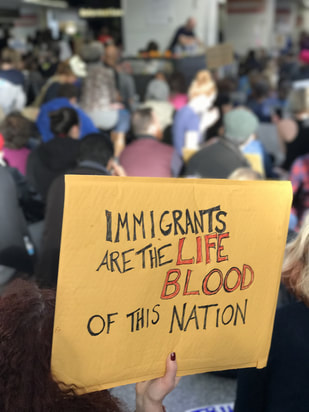 Divisive Politics Here we go, once again. As he did throughout his campaign, and now well into his presidency, President Trump is using the political ploy of pitting his base against the “other” by hinting about race and ethnicity, and by pandering to beleaguered, underemployed, or just plain frightened voters. Now he is using that ugly political ploy to foment a specious attempt at immigration reform. This August, along with Republican Senators Tom Cotton of Arkansas and David Perdue of Georgia, Trump introduced the Reforming American Immigration for Strong Employment, the RAISE Act. Of course, the use of the word “raise” to name the bill is part of the ploy. The contention of the bill is that by limiting immigration, the labor force would shrink and, for working-class Americans, the availability of jobs would increase and wages would rise. Congress has tried limiting immigration to raise American wages three times in American history (1882, 1924, 1964) and it failed each time. And if passed, the bill would cause great pain to those immigrants already here and seeking to reunite with their families, and it would cause great turmoil among other potential immigrants having already spent a long time on visa waiting lists.  Cynicism and Racism at its Best The RAISE Act would cancel family-based immigration which reunites scores of families. Sorely hurt would be those applying for entry for their parents. As for those already on waiting lists, they would be culled by a point-based system bent toward favoring those potential immigrants with wealth, higher education, and English proficiency – read “white” or “European” or “upper-class Asian.” Of course, immigration would become a trickle and that's what the sponsors want. And they intend to get it by avowing that this has nothing to do with race. They cynically say that its cause is to protect and benefit working Americans. The thing is, it won't. The bill is just the culmination of a decades-long attempt to thwart an immigration policy largely put in place during the Johnson years – you know, Johnson, the president who championed civil rights. This effort hearkens back to the 1920's when the Congress, also then in a “protectionist” mood, limited immigration mostly to Europeans. With this point system, the door would be slammed on immigrants from Africa, Asia, and Latin America. That is the object – those with darker skins need not apply. If you are already here and your family happens to be from one of those areas and can't meet the point system – too bad. The Lies About Getting a Raise American history proves that reducing immigration has little bearing on increasing wages or opening up more jobs. Our nation had to overturn three restrictive immigration acts to keep our economy rolling. Three times we had to reopen our doors. We needed eager people with new ideas willing to work, people willing to be American yet bringing their invigorating cultures, people willing to make America great again – if I may borrow a phrase. RAISE would close those doors once again. One case in point: Many companies in Silicon Valley, where I live, were started by immigrants allowed into this great nation by family-based immigration visas. The National Academy of Sciences, with a survey measured over 10 years, concluded that the impact of immigration on the wages of native workers was negligible. Negative impacts were felt mostly by immigrant workers already here, or native-born workers with less than a high-school education – about nine percent of the population. The agreement among many economists is that immigrants have little impact on American wages. The Cotton-Perdue bill won't create a skills-based immigration system and it won't increase American wages. But it will wreak havoc on our economy and, worse yet, it will embolden the racism of the alt-right.  The Truth About Wages and Immigration The truth of American history shows that Latino, Filipino, Chinese, Japanese, Ethiopian, and other minority immigrants serve as the spine of many parts of the nation's economy, especially in agriculture, construction, and service-oriented industries. What's more is that many of these folks further spur economic growth by opening businesses themselves and creating even more jobs. Ethnic ghettos may exist at first. Yet Irish, Italian, German, and other groups eventually became part of our rollicking American society. So will others. If skin color bothers you, go hide under a bed. I have never personally seen an absolutely white person nor an absolutely black person. The many shades in between are what make humans different, and alike. If politicians could overcome their phony purity-of-heritage standards and really wanted to improve wages, they have many options. Go for a higher minimum-wage increase, understanding that all American economies, from rural to urban, cannot support the same minimum wage, but at least propose some federal guidelines. How about addressing pay equity for women? Strengthening our national health care system would relieve workers and employers of prohibitive expenses – not to mention just putting the populace more at ease on that front. And, how about coming up with comprehensive, sensible – and just (You know what I mean.) – immigration reform? RAISE doesn't do anything to address the 11 million living in the shadows. Give them a path to citizenship. They already pay taxes. In fact, economic studies have shown that immigrants pay more into the system than they take out. They use less public benefits than the native-born. What about the backlog of those waiting for immigration? And what about the backlog of those waiting to be united with their loved ones? Somebody is not doing their job. And RAISE is not a job-doer. It's a racist sham catering to a frightened base. Raising the Matter of Cruelty Fortunately, the chances may be slim for passing RAISE. Democrats probably won't buy it. Plus, Trump has many problems. He is alienating his Republican partners in the Congress. His approval ratings are plummeting. The Russian investigation is causing him great consternation. And he's ranting about a wall that Mexico won't pay for, so he's threatening a budget default. Hopefully, RAISE will fall by the wayside. Maybe some senators more sane than Cotton or Perdue will produce some effective immigration reform. Many American-immigrant families have filed papers to reunite with their families. Many are already at an advanced age. The act should at least have provision for those who have been waiting too long. At my practice, I have an 80-year-old client who filed for her sister 20 years ago. If RAISE passes without that provision, that 20-year wait could be in vain. And that raises the matter of shameless cruelty to fellow human beings.
0 Comments
Leave a Reply. |
Archives
July 2024
Categories
All
|
CONTACT
|
|

 RSS Feed
RSS Feed